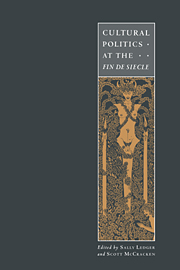Book contents
- Frontmatter
- Contents
- List of illustrations
- Notes on contributors
- Acknowledgements
- Introduction
- 1 The flight to the real
- 2 The New Woman and the crisis of Victorianism
- 3 Empire, ‘race’ and feminism at the fin de siècle: the work of George Egerton and Olive Schreiner
- 4 W. B. Yeats and Irish cultural politics in the 1890s
- 5 The double lives of man: narration and identification in late nineteenth-century representations of ec-centric masculinities
- 6 Henry James and the spectacle of loss: psychoanalytic metaphysics
- 7 ‘A very curious construction’: masculinity and the poetry of A. E. Housman and Oscar Wilde
- 8 The Pilgrims of Hope: William Morris and the dialectic of romanticism
- 9 Urban utopias: socialism, religion and the city, 1880 to 1900
- 10 Vampires and the empire: fears and fictions of the 1890s
- 11 Utopia, Limited: nationalism, empire and parody in the comic operas of Gilbert and Sullivan
- 12 Technologies of monstrosity: Bram Stoker's Dracula
- 13 Postmodernism, a Chance to reread?
- 14 Is market society the fin of history?
- Select bibliography
- Index
9 - Urban utopias: socialism, religion and the city, 1880 to 1900
Published online by Cambridge University Press: 29 September 2009
- Frontmatter
- Contents
- List of illustrations
- Notes on contributors
- Acknowledgements
- Introduction
- 1 The flight to the real
- 2 The New Woman and the crisis of Victorianism
- 3 Empire, ‘race’ and feminism at the fin de siècle: the work of George Egerton and Olive Schreiner
- 4 W. B. Yeats and Irish cultural politics in the 1890s
- 5 The double lives of man: narration and identification in late nineteenth-century representations of ec-centric masculinities
- 6 Henry James and the spectacle of loss: psychoanalytic metaphysics
- 7 ‘A very curious construction’: masculinity and the poetry of A. E. Housman and Oscar Wilde
- 8 The Pilgrims of Hope: William Morris and the dialectic of romanticism
- 9 Urban utopias: socialism, religion and the city, 1880 to 1900
- 10 Vampires and the empire: fears and fictions of the 1890s
- 11 Utopia, Limited: nationalism, empire and parody in the comic operas of Gilbert and Sullivan
- 12 Technologies of monstrosity: Bram Stoker's Dracula
- 13 Postmodernism, a Chance to reread?
- 14 Is market society the fin of history?
- Select bibliography
- Index
Summary
Linguistic liaisons and transformations lie at the heart of the struggle to explain and debate the nature of social structures at the end of the nineteenth century. At the same time that political activists, philanthropists and urban planners were changing the face of the concrete urban world, the questions they were asking were modifying public discourse by exposing its inadequacies in formulating relevant questions and in offering acceptable answers.
From the opening of the eighties there was a general sense that the thinking about social issues had overtaken the public discourse available to articulate it. The ‘unintended irony’ of the sociological writings of this period highlights the strains that were becoming apparent. By the close of the 1880s, Charles Booth's Life and Labour of the People: Poverty Series had explicitly stated the need for an ‘objective’ language. Yet his writings reveal how difficult this was to achieve. The record of his observations is constrained by the poverty of a language that described the poor as ‘thriftless’, ‘loafers’ and ‘scroungers’. His recognition of this problem and his attempts to find a more objective terminology created a linguistic conflict that channelled him reluctantly towards ‘quasi-socialism’, a position which held little conviction for him politically or intellectually. The reality of the difficulties he faced are underlined by his evident relief when he describes the educated artisan class where the language at his disposal at last fits the observable social facts.
Indirectly, these linguistic tensions constituted an attack on church authority.
- Type
- Chapter
- Information
- Cultural Politics at the Fin de Siècle , pp. 184 - 201Publisher: Cambridge University PressPrint publication year: 1995
- 2
- Cited by



